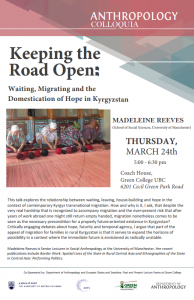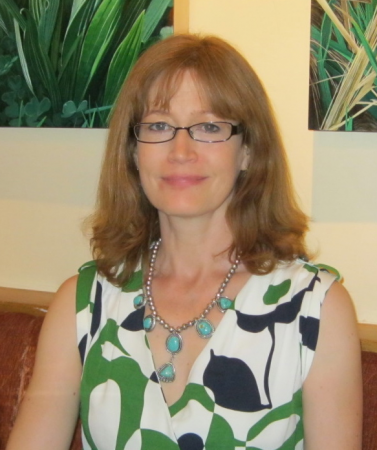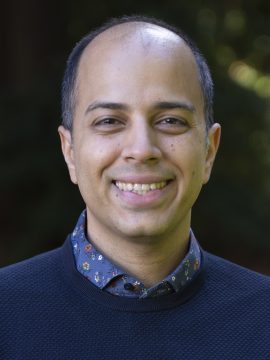Anthropology Colloquium is the department’s speaker series that invites a mixture of anthropologists from within and outside of UBC to present their research. This speaker series is scheduled throughout the academic year, typically with a lunch reception in the AnSo Lounge.
Keeping the Road Open: Waiting, Migrating and the Domestication of Hope in Kyrgyzstan
Thursday March 24, 2016
Green College Coach House
5:00 – 6:30 pm
Event Poster: PDF
Dr. Madeleine Reeves
Senior Lecturer in Social Anthropology at the University of Manchester
Abstract
This paper explores the relationship between waiting, leaving, house-building and hope in the context of contemporary Kyrgyz transnational migration. How and why is it, I ask, that despite the very real hardship that is recognized to accompany migration and the ever-present risk that after years of work abroad one might still return empty handed, migration nonetheless comes to be seen as the necessary precondition for a a properly future-oriented existence in Kyrgyzstan? Critically engaging debates about hope, futurity and temporal agency, I argue that part of the appeal of migration for families in rural Kyrgyzstan is that it serves to expand the horizons of possibility in a context where the immediate future is envisioned as radically unstable.
I focus on two strategies that figured during my fieldwork central to this practical and imaginative work of ‘keeping the road open’: house-building, particularly for newly-married sons, and ‘doing up a passport’ (passport kyluu): that is, the purchase of Russian passport and the (official, at least) revocation of one’s Kyrgyzstani citizenship. Such strategies, I suggest, point to a paradox at the heart of contemporary Kyrgyzstani migration: the vast majority of my interlocutors spoke of labour migration in Russia as a temporary process that would ultimately create the conditions for meaningful family life in Kyrgyzstan. Yet such possibilities are increasingly seen to be contingent, not just upon a (potentially indefinite) period of labour far from home, but on a displacement of political membership: the ceding of Kyrgyzstani citizenship in favour of the Russian citizenship that guarantees better working conditions abroad, and which protects against the risk of deportation.
Bio
Madeleine Reeves is Senior Lecturer in Social Anthropology at the University of Manchester, and a member of the ESRC Centre for Research on Socio-Cultural Change. Her interests lie in the anthropology of politics, space and (im)mobility, based on long-term ethnographic fieldwork in Kyrgyzstan and Russia. She is the author of ‘Border Work: Spatial Lives of the State in Rural Central Asia’ (Cornell, 2014), which won the 2015 Rothschild Prize of the Association for the Study of Nationalities and the 2016 Alexander Nove prize of the British Association of Slavic and East European Studies. She is the co-editor, with Johan Rasanayagam and Judith Beyer of ‘Ethnographies of the State in Central Asia: Performing Politics (Indiana 2014), and with Mateusz Laszczkowski, of a special issue of Social Analysis on ‘Affective States’ (2015).
Co-sponsored by the Department of Anthropology and the Eurasian States and Societies: Past and Present Lecture Series at Green College



